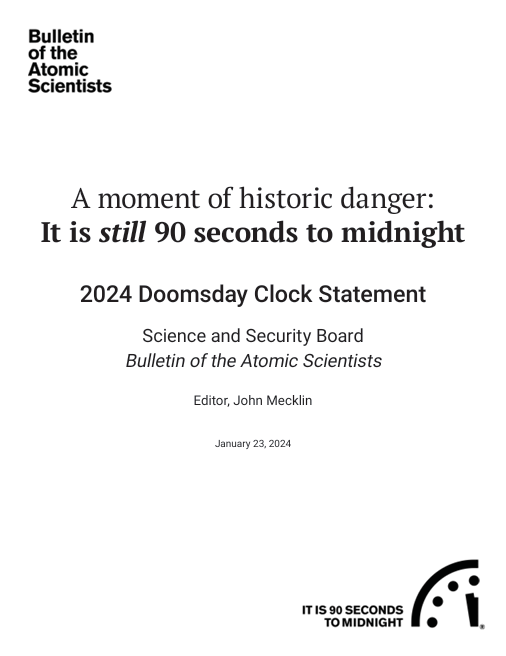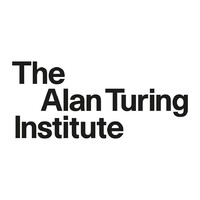Highlights the continued critical state of global security and environmental stability, symbolized by the Doomsday Clock’s setting at 90 seconds to midnight for the second consecutive year. This setting, the closest to midnight the clock has ever been, underscores the urgent threats posed by nuclear proliferation, climate change, and disruptive technologies, particularly advancements in artificial intelligence (AI).
Key Points of the Report
- Nuclear Risks: Emphasizes the heightened risk of nuclear escalation, mainly due to Russia’s invasion of Ukraine and the potential use of nuclear weapons in the conflict. It also notes the suspension of the New Strategic Arms Reduction Treaty by Russia and the expansion of nuclear capabilities by Russia, China, and the United States.
- Climate Change: 2023 was recorded as the hottest year in history, with global carbon emissions from fossil fuels hitting record highs. The report underscores climate change’s immediate and long-term impacts, including extreme weather events affecting millions worldwide.
- Advancements in AI: The Bulletin warns of AI’s fast, possibly unchecked progress and stresses its existential threats. Risks include intensifying misinformation, destabilizing democracy, and dangerous military uses like autonomous weapons.
- Global Governance and Cooperation: Stresses the need for improved global governance of disruptive technologies and international cooperation to handle these critical threats. It calls on leaders from the U.S., China, and Russia to take bold actions to reduce these risks.
- Public Engagement and Action: Advocates for public and political engagement to address these critical issues. It emphasizes the role of younger generations in driving change and the need for concerted action to prevent global catastrophes.
Overview
A moment of historic danger: It is still 90 seconds to midnight
Explores global issues like the Ukraine war, raising concerns about eroded international norms and nuclear escalation. Actions by key players like Russia, including suspending the New START treaty and deploying tactical nuclear weapons, have heightened the nuclear threat.
Moreover, it underscores the alarming impact of climate change, citing 2023 as the hottest year on record and emphasizing the devastating floods, wildfires, and other climate-related disasters that have affected millions worldwide. Despite some positive developments in addressing climate change, more than current efforts are needed to prevent catastrophic global warming.
An undiminished nuclear threat and a new arms race
Analyzes the current global nuclear situation. It emphasizes the intricate challenges and risks related to nuclear proliferation and modernization. Furthermore, it underlines the strained relationships between major global powers, focusing specifically on Russia’s actions in the Ukraine conflict.
Russian President Vladimir Putin’s decision to “suspend” the New START treaty, despite the lack of a formal procedure for such action, highlights concerns about transparency and accountability in Russia’s nuclear activities. This action and the broader breakdown of the nuclear arms control regime increase uncertainty and instability in the global security landscape.
Also, it underscores the increasing trend of nuclear modernization programs among nuclear-armed states, such as the United States and China, on the edge of a potential arms race. The debate within the United States about expanding its nuclear arsenal to counter China’s perceived growth emphasizes the escalating tensions and competition in the nuclear domain.
The mixed outlook for climate action
Offers an overview of the world’s response to climate change, noting both positive trends and ongoing challenges. It underscores the urgency of climate action by citing the rise in climate-related disasters like wildfires, floods, and heatwaves. While there has been progress in deploying clean energy technologies and policies to reduce carbon emissions, the section emphasizes that global greenhouse gas emissions continue to rise. This trend poses a significant obstacle to achieving the goals outlined in the Paris Agreement, mainly the target of limiting global warming to 1.5 degrees Celsius above pre-industrial levels.
Emphasizes the need for a low-carbon economy, a shift from fossil fuels, and enhanced global cooperation to mitigate climate change. It urges ambitious commitments from all sectors to achieve net-zero CO2 emissions and prevent environmental degradation. Furthermore, it draws attention to the disproportionate impact of climate change on vulnerable communities, emphasizing the need for equity and social justice in climate action efforts. It stresses the importance of addressing the root causes of climate change and implementing policies prioritizing resilience and adaptation to protect those most affected by environmental disruptions.
The expanding scope of biological threats
Examines the emerging challenges of biological risks due to life science and technology advancements. It highlights the dual risks from accidental and deliberate misuse, worsened by the increased accessibility of advanced tools. Focuses on the intersection of AI and biological technologies, presenting new potential threats. It emphasizes the transformative impact and exponential growth of generative AI and its implications for handling harmful biological agents. The misuse of AI in biological research and development is a significant concern.
Underlines the need for strong regulations and oversight to manage risks from AI and biological tools. It cites President Biden’s executive order as a step towards mitigating these risks, emphasizing stringent standards and transparency for safe and ethical use. Promotes proactive, collaborative management of biological threats in the advancing tech era. It calls for global cooperation, ethics, and strategic foresight in the AI-biological sciences interplay. Stakeholders can mitigate potential dangers and protect global well-being by encouraging responsible innovation and governance.
AI and other disruptive technologies to watch
Explores the impact of artificial intelligence (AI) on global security, governance, and society. It highlights advancements in generative AI, such as the progress in large language models like GPT-4, which have improved text generation and natural language processing. Hence, the discussion focuses on the increasing concerns about the potential risks of advancing AI technologies. The document emphasizes the ethical and security debates due to AI’s sophistication, with experts warning about its rapid development without proper safeguards.
Spotlights the debate over AI-related risks, contrasting speculative existential threats with current challenges. It calls for a balanced evaluation of AI’s risks and benefits, recognizing its transformative promise and ethical issues in information integrity, military use, and societal governance. Moreover, it highlights the need for ethical governance in handling AI complexities. Transparency, accountability, and international cooperation encourage addressing AI challenges like information corruption, disinformation, and autonomous weapons. This approach aims to maximize AI’s beneficial potential while reducing its adverse effects on global security and society.




